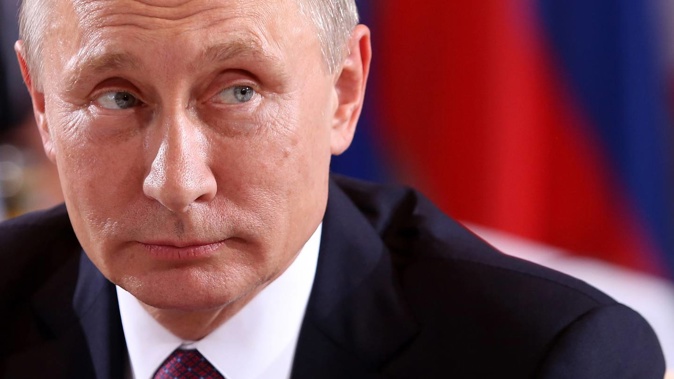
Leaked Kremlin documents appear to confirm that Russian President Vladimir Putin personally authorised an operation to help Donald Trump win the 2016 US election.
Trump has labelled the documents "disgusting fake news".
The papers in question, obtained by The Guardian and dismissed as "a great fiction" by Russia, appear to have come from a closed meeting of the country's national security council on January 22, 2016.
At this point, Trump was the early frontrunner for the Republican Party's presidential nomination, which he went on to claim. He then beat Democrat Hillary Clinton in November's general election.

Donald Trump with Vladimir Putin in Helsinki, where they held a summit in 2018. Photo / Getty Images
The most significant Kremlin document, labelled No 32-04/vd, describes Trump as the "most promising candidate" from Russia's perspective.
It says he is an "impulsive, mentally unstable and unbalanced individual who suffers from an inferiority complex" and his ascent to the presidency "will definitely lead to the destabilisation of the US's sociopolitical system".
"It is acutely necessary to use all possible force to facilitate his election to the post of US president," the paper says.
It also alludes to kompromat (compromising material) that Russia supposedly has on Trump, referring to "certain events" that happened during his previous visits to Moscow as a businessman.
Security council members are told they can find details in appendix five, paragraph five. Notably, however, The Guardian has not seen the appendix and has no idea what, if anything, it contains.
As others have already pointed out, the fact that the appendix was not also leaked is further reason to approach these documents with scepticism.
The newspaper says it has shown the material to independent experts, who say it "appears to be genuine".
"Incidental details come across as accurate. The overall tone and thrust is said to be consistent with Kremlin security thinking," it reports.
It also says Western intelligence agencies have "been aware" of the documents for several months and have "carefully examined them".
And it has confirmed that a meeting of Russia's national security council did indeed occur at the Kremlin on January 22. There is an official photo from the occasion.
Among the attendees were Putin, prime minister Dmitry Medvedev, foreign minister Sergei Lavrov, GRU (military intelligence agency) head Sergei Shoigu, SVR (foreign intelligence service) Mikhail Fradkov and FSB (spy agency) head Alexander Bortnikov.
At the time, the Kremlin said the meeting was convened to discuss economic policy.

Trump has blamed the "radical left" for the documents, which he labelled "fake news". Photo / Getty Images
In a statement, Trump called The Guardian's story "disgusting".
"This is disgusting. It's fake news, just like RUSSIA, RUSSIA, RUSSIA was fake news," said the former president.
"It's just the Radical Left crazies doing whatever they can to demean everybody on the right. It's fiction, and nobody was tougher on Russia than me, including on the (Nord Stream gas) pipeline, and sanctions.
"At the same time we got along with Russia. Russia respected us, China respected us, Iran respected us, North Korea respected us. And the world was a much safer place than it is now with mentally unstable leadership."
Judging by that last sentence, Trump appears to have taken note of the Kremlin's alleged characterisation of him as "mentally unstable".

Trump has hit back, claiming to be "mentally stable". Photo / Getty Images
The leaked paper does not just focus on Trump, however. It also includes a more general assessment of America and its weaknesses, highlighting an "anti-establishment mood" and a "deepening political gulf between left and right".
After the security council meeting, Putin issued a new decree setting up a secret commission, whose task was to achieve the goals laid out in No 32-04/vd. The SVR, Russia's foreign intelligence agency, was told to gather more information to support the commission.
Several weeks later, Russian hackers breached the servers of the Democratic National Committee. The material they found, including thousands of private emails, was released before the election in an attempt to harm Clinton's campaign.
US intelligence agencies long ago concluded "with high confidence" that Putin authorised a campaign of cyber attacks and fake news stories designed to hurt Clinton.
In a statement ahead of President Joe Biden's bilateral summit with Putin last month, Trump made it clear he still believes Putin's denials over that conclusion from his own country's intelligence experts.
Text by Sam Clench, news.com.au
Take your Radio, Podcasts and Music with you









